HIT CHANNEL EXCLUSIVE INTERVIEW: December 2018. We had the great honour to talk with a legendary singer: Sonja Kristina. She is best known as the frontwoman of Curved Air, a pioneering British progressive rock band. Curved Air just released the live album “The Second British Rock Meeting 1972”. Also, Sonja performs “The Fish” on the all-new “A Life In Yes: The Chris Squire Tribute”. Last year, she released her 2-CD solo “Anthology” compilation. Read below the very interesting things she told us:
 “The Second British Rock Meeting 1972” features a version of “Vivaldi” which lasts over 30 minutes. Did you use to improvise in those days?
“The Second British Rock Meeting 1972” features a version of “Vivaldi” which lasts over 30 minutes. Did you use to improvise in those days?
A lot of the band’s songs we did, had long improvisations, not only in “Vivaldi”, but compositions could be extended and any of the instrumental parts could be very free and it started to be part of the band, in a sense. This is what we did. I was so happy to get on stage and play free, which is exactly what I did with the musical “Hair” I played. We were very free on stage, but there were parts that suddenly some of those were choreographed, so there would be set parts speaking and moving on stage and then you could go anywhere, and later you could come back to get to the same scene. Yes, we did a lot of improvisation.
You record a new version of “Frank Mills” (from “Hair” musical) in your solo “Anthology” (2017). How emotional was it to record this song almost 50 years later?
When I sang it originally, I was just 19 and it was very nerve-racking, as I was the only person on stage, after having been a lot of activity on the stage. It was very well-received. I had to sing it the way the American cast did. We had one actor from the American cast there, Andy Forray and he was talking there and I just heard the story of the song. He told the story and the musical director liked my approach. I have seen various different versions of it, in different performances of “Hair” and in different decades. They have always been very different. I was very still and I had to sing the song very straight. Yes, it deserved it. This is where I began, so it was something quite precious. I was working with Robert Norton before, he is now the keyboard player in Curved Air and he had written some parts, so we created something from it that had the feeling of the original. My voice is low now, so he transferred the sound a bit. So, I told the story again. It was now me telling the story and back then, it was me then telling the story.
 How did it happen to participate in “A Life In Yes: The Chris Squire Tribute” album with “The Fish” song?
How did it happen to participate in “A Life In Yes: The Chris Squire Tribute” album with “The Fish” song?
It was through Billy Sherwood who is very busy with a lot of cover versions of original material with all sorts of people from all over the prog universe. Different musicians have been part of these collaborations and he makes big collaborations that way. I had worked with him once before on one of his songs on an album. So, when he was doing this tribute to Chris Squire -who he was very close to, now Billy Sherwood plays bass in Yes- he asked me to do this little bit song, just music that is really different, kicking up a feeling, with a lot a layers and strange lyrics. It was quite challenging to do, but I think it has been done very nice. It’s an interesting collective track.
What are the current projects you are involved with?
I’m doing the “Excalibur”. I sang a song on the latest album (ed:“Excalibur IV- The Dark Age of the Dragon” -2017) and I was so pleased with the recording and the production of it, that I put it on my solo album (ed: “Anthology”) album. It’s called “The Passion”. They ‘ll do a concert, I think it’s a festival, sometime in August next year. I’ve been asked to perform there and I think I will be able to sing a couple of other songs, as well. The details of it have not been finalized yet, but that would be wonderful, because I wanted to be part of their stage show, because it sounds like an excellent and exciting theatrical extravaganza. So, this will be a start. I am also doing shows with The Norman Beaker Band. The band members are very well-respected session musicians.
They play since the ‘60s and they’ve worked with Jeff Beck and all these important people. I played at a festival last year, I was just doing my own set and they were my backing band. We did three songs in this Summer of Love Festival in Windsor in England and then they wanted me to do more shows with them. I can do other songs and I work with really fine players. We did one show already last year and I sang one song from my solo album. I sang “The Passion”. I sang “Me and Bobby McGhee” which is one of my favourite Janis Joplin songs. We could do a couple of Curved Air songs for the audience if they will be ready for that. It’s just a chance for me to grow, in a different way. I can write new songs, I can perform different songs that I may write. It will help me to grow as a performer, even at my great age.
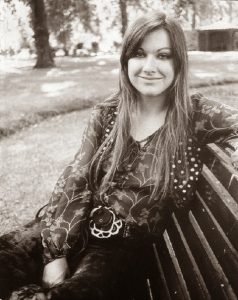 How much your role in “Hair” musical influenced your later career as a frontwoman in a rock band?
How much your role in “Hair” musical influenced your later career as a frontwoman in a rock band?
“Hair” was a wonderful experience. I had done some drama at school, we did a couple of Shakespeare plays and then I did a drama exam. Then, I went to a drama college just for a year. I was lucky enough to get into the cast of “Hair”. The whole thing was about more energy, about filling as much space as possible on the stage with your energy and interacting with the rest of the cast with trust. We had to do some exercises where you ‘d fall back on different people and you had to trust that they will catch you. We ‘d spent time sitting in front of each other, just staring at each other and touching each other’s face. The whole thing was to make us very-very natural on stage. When we performed, we had to perform with maximum energy. Every time we were coming up to the opening time, the writers of the play would say: “More energy! More energy!” It was a 3-hour show, we did 8 shows a week. So, I think I grew with this because I learned to be completely free, to be able to move very freely on the stage and to perform with great energy, to feel very at home with being on the stage and also at home with the audience and to create the where I am, other than doing something rehearsed. In that way, it all made sense. That was what I gained from being in “Hair”. It was a fantastic experience! Very good. The best training I have ever had.
Are you satisfied with the response you got from fans and press for the latest Curved Air studio album “North Star” (2014)?
It’s a very nice thing that everybody likes it. It was really a challenge for us to make because nobody could say: “I was leading it”, in a sense that somebody chose the songs, the pieces of music that the different individual worked in. So, the album has a Curved Air potential. It was developed as we played. We could improvise and innovate as the Curved Air, as I said before. Curved Air does improvise, keeps it fresh. It doesn’t necessarily play exactly the same way all the time. With these musicians we can do that, too. So, everybody worked in the music and then we selected which parts we were going to perform. We all had to talk together and we did. I have a house which everybody came in and stayed then and I have a little studio at the back, so we would work on the arrangements of the songs. We just set up the instruments, some of them had never been there. Everybody had to come in a long way away, because the four of the band come from the extreme West, from Exeter and Bristol over there. So they have to travel over there every time we do a show. For this recording, too. For the writing. It’s better that they came up late for a few days, so they really intensively worked on the songs together.
That time it was difficult because the people who worked ideas in, they had set ideas on the feel that the songs should have. Sometimes they (ed: some members) demanded things that weren’t necessarily in the vocabulary of the others. When it was recorded, when the backing tracks were over, then the guitarist became ill and he left the band. He wanted to go and not to carry on. So, we had to get in another guitarist, so we asked Kirby (ed: Gregory), who played with the band in “Air Cut” (1973). We asked him to come in, so we already had completed the songs for the first time, and here another guitarist had to play the parts again. So, we created it. He made some changes and he wanted to record that and then the members would come in and they chastised me because I had changed the harmony as I liked to hear it in Kirby, with his rock playing. It was all very delicately explored and some small overdubs were done to make it as perfect as possible. When we mixed this, I knew that we had something really good. I just felt that it showed us that it’s better than could have expected and it was true to everybody’s intention. Everybody has played really beautifully and it captured the essence of Curved Air and the essence of the individual musicians. So, when it went out and it got reviews, the response was very gratifying. People really do love it, so we think this is a very important moment in Curved Air legacy.
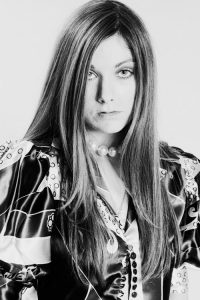 Why you decided to record The Beatles song “Across the Universe” on “North Star” album?
Why you decided to record The Beatles song “Across the Universe” on “North Star” album?
Because it’s a song that I really love. I recorded it because I with some members of the band, we did an acoustic version at a little festival called “War What is it Good for?”, which was an anti-war festival in 2010, in a little bar in Camden. It went so well and the audience was singing along with the chorus. There is a video of it on Youtube from the gig somebody took at the time. I wanted to do something with this song, so we just did it. It’s very sparse, the sound is like in space, it voiced what is happening inside somebody’s mind and we were approaching it as an outer space thing. It was the concept for the production. It’s very intimate and we thought that the song’s words are very close to it and this is the way I did it and the way that it should have sounded. It’s very intimate, very spacey, very imaginative, very thoughtful and it’s such a magical song. I’m very pleased with our version of it.
Did you enjoy doing Cruise to the Edge with Curved Air in 2017?
Very much. I had never been on a big cruise ship before. I have always wanted to do a cruise. The only thing that it came close to it, was the vessel we took to go to Sweden and back with my family when I was small and then we went on a big ferry where we slept overnight. I love boats too, so it was the first time I had been on a cruise. It was fantastic. The performers were all very good musicians and the audience were funny people who love this music. Progressive rock musicians created something that it doesn’t fit in any set place. These huge bands had a different style to the others. So, this mingling of players is just wonderful. As you went to the restaurant of the boat, people would stop you and wanted to talk to you about your band and things like that. So much of the time I stayed in my cabin. I got meals in the cabin. The days we didn’t work, we could go and see other bands. There was a beauty salon on the boat and I had some massage. I always want to have some massage to relax. It was fantastic the boat. The weather was really lovely, it was a bit windy, but certainly not wild and it was warm. We had nice cabins with a balcony outside, so we could stand outside. All in all, it was an amazing experience. I recommend it.
In 2014 you received “The Guiding Light Award” at Prog Magazine Awards. What does this recognition mean to you?
It’s wonderful. I had an award before, in 1971, “Top Female Vocalist” from Sounds magazine, which was one of the top music magazines at the time. I still have that award, I keep it on the shelf. This was only the second award I had in my lifetime. It’s so nice to be recognized by my peers, people who started playing in the late ‘60s and the early ‘70s and who are still working. Since then, popular music has been through punk, house music, reggae, ska, there are so many different styles of music and it’s very nice now that progressive music has its place. It’s the enthusiasm for it that just came back a few bands who were touring in the ‘70s. So, when we formed again in 2008 we went on tour and we went to play the music the fans wanted, all the music I believe, because you have to be of a certain age to have been to a Curved Air concert, like in between 1970 and 1976 when we worked in the UK and went on tour in Europe and America. Over the years, Jerry Ewing started out his Prog Magazine, a beautiful glossy full colour magazine that is distributed all over the world and there are progressive rock festivals in places like Portugal, Italy and everywhere.
Progressive rock music at the time was a new development from rock ‘n’ roll and pop music. It was a new sound’s mixture of all different things. But now, it is what it is and it has a place for all the other very venerable joyous guys and a lot of musicians. I gave a little speech to all these famous people saying what it is like to get this award and as I came back to my place, Peter Gabriel stood up from his seat and said: “Congratulations!” and gave me a hug, so that was lovely. I’ve seen him maybe two times over the years. Genesis used to support us in their early days, they used to support Curved Air and then Stewart Copeland (ed: Police, Curved Air drummer), my husband, played some drum percussion down on Peter Gabriel’s tracks. So, we went to stay at Peter Gabriel’s house and I spent much time with him then. He and other men too, wonderfully managed the WOMAD. He’s very powerful. In fact, he’s one of my heroes, because he’s very unique, very expressive. He’s one of the great voices of our time.
 Did you expect the commercial success of “Back Street Luv” single (No.4 in the UK Singles Chart -1971)?
Did you expect the commercial success of “Back Street Luv” single (No.4 in the UK Singles Chart -1971)?
At the time, not really. It maybe was a little disturbing to release as a single, because we hadn’t released a single before, which was just like a kind of a showcase for the band. The first single was “It Happened Today” with “What Happens When You Blow Yourself Up” on the b-side. It’s a very simple song with very simple lyrics that were very truthful and honest. As soon as I heard it played on the radio by DJ Alan Freeman, who played all the interesting Charts music, it sounded really good, so I had a feeling then that it would do well. I was always very touched by the way people all of a sudden, they identify with the song that we came up with, which is basically about skipping school and hanging out with undesirable older boys and men, just having a clandestine life. So maybe they don’t know what it is about, but other people obviously when they hear it, they interpret it in their own way and I find that fascinating.
I was surprised when I read that “Young Mother” from “Second Album” (1971) was about Jackie Onassis. What is the meaning of the song?
Darryl (ed: Way –violin, keyboards) wrote the song, he performed it and he had lyrics: “This young mother in style/ finds hard to keep her smile”. When I was trying to sing those words, it didn’t sit well with me, so I worked with the tune on my own and then came up with the new lyrics, which were based on how the melody and the movement of the song interacted with me. It’s a big feeling and cry, a demand for respect really.
How helpful was the appearance of Curved Air at the Beat Club TV show in Germany in 1971?
Yes, it was important. It was the second time we had played a big festival like that in Europe. It was The Second Rock Gathering that we had played and we were building our audience there. The bands that were performing there were all exceptional and it was good to be on the same bill as all those. Also, when we finished the festival, we went on a dome just as we were packing up to go and they all gathered around us and stayed. It was a really magical moment and a very rapturous response.
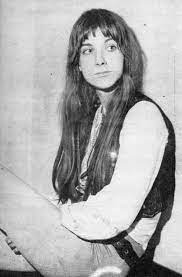 Do you have any memories of the tour with Black Sabbath in January 1971?
Do you have any memories of the tour with Black Sabbath in January 1971?
They were very crazy guys. They were all naughty boys. They broke eggs on their manager’s car, they used to throw things out of the window as they were driving along the motorway and they would put things in drinks. I started a relationship with their tour manager (ed: Malcolm Ross) and then we got to get married -after a while- but when we went to the hotel room with Mal, they were sending us the room service late at night, hanging condoms full of water at the door of us, these kinds of things… Funnily enough, I had very long chats with Geezer Butler and Tony Iommi about black magic and spiritual things, because that subject matter was initially behind their performance and their material and all that vibration. It was so interesting that we were opening up the show for them. Because our music was so different, but the audience really liked what we did and it was good to feel that we matched Black Sabbath with our energy and power and that the audience were transported to other levels than around of devils.
Are you proud of “Air Cut” (1973) album? It’s my favourite Curved Air album.
Yes, again it was a challenge to make like “North Star”. Darryl and Francis (ed: Monkman –keyboards, guitar) were opting to make their own music and also to have a rest. They were very tired, very burned out and they couldn’t keep up the pace. So, I got to get a new band featuring Eddie Jobson (ed: later in Roxy Music, Jethro Tull and UK), who had supported us when we played at Mayfair Ballroom in Newcastle with his band Fat Grapple. He was a big fan of our band and he knew all the songs from Curved Air and he also learned songs from a lot of other progressive rock bands. He played keyboards as well, so he was obviously the only person who was equipped to step into Darryl and Francis’ shoes, as he was able to play the Curved Air songs as they had been and also to create new songs that fitted with the Curved Air roster. Then, we auditioned Kirby and I was just blown away by his sound. He had such a big, wild sound and he was a wonderful concert performer. He kept very physical and his playing was powerful.
So, those two and Jim Russell, a solid, expressive drummer and Mike Wedgwood (bass), who had been playing with us on “Phantasmagoria” (1972) and he has inherited the arrangements from the old line-up to this line-up. We had the challenge to make a new album and we set about putting a couple of my songs in, “Elfin Boy” and “Easy” and I wrote lyrics for the other ones. We were produced by Martin Rushent (ed: The Stranglers, Buzzcocks), who became a very famous producer and he was lovely to work with. He was key in helping us develop the songs and the arrangements of those. In the first three Curved Air albums, Darryl’s writing had been quite simple and lyrical and Francis’ music was much more rocky and in terms of peace of mind, he was very-very epic. So, we had an epic piece from Eddie with “Metamorphosis” with rocky things from Kirby and a violin instrumental, “Armin”. So, it had the pillars of Curved Air success to me. I think it was more immediate, it would reach a wider audience, in a way. It had all the elements of Curved Air. I thought it had a much more immediate appeal. It was a little drama to catch on, but now it’s one of the most popular Curved Air albums.
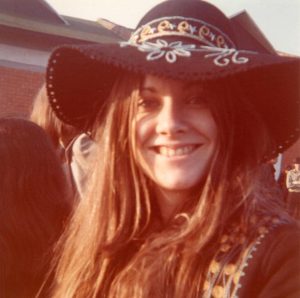 Do you think Darryl Way’s (violin, keyboards) perfectionism helped Curved Air or caused more problems?
Do you think Darryl Way’s (violin, keyboards) perfectionism helped Curved Air or caused more problems?
No, I think he wanted us perfectionists, for him, because he couldn’t bear to hear live recordings, because he thought they were imperfect and they couldn’t be improved. When we performed the songs, the shows all went down really-really well and he played beautifully the songs. He become more (ed: perfectionist) after he left and built a studio at home where he could just redo things over and over until they are perfect. When we went to collaborate together in 2008 -because we’ve tried- if Francis couldn’t do it, Darryl could do it, because Francis wanted to be wild and in the moment and he didn’t want to do a smooth show, which is what Darryl wanted to do and Darryl didn’t want to improvise, so they moved over the years so far apart. So, it didn’t affect us particularly but when we tried to get a piece together, I think it has been a bit more difficult, it was more challenging to work with him, because he had his vision and that was just very set and very fixed.
Was it an interesting experience to record the Christmas Carol Concert for John Peel’s Top Gear show with Marc Bolan, Robert Wyatt, Mike Ratledge and Faces in December 1970?
Yes, it was fantastic to be in the same room with all those wonderful people. Rod Stewart sang a beautiful version of “Away in a Manger”, because it was so moving. I’ve got a recording of the concert, it’s available on line. I saw that and that’s really beautiful and the versions of the different carols. I have to write something about it on my Facebook, because the Christmas season in coming. On Facebook, I commented singing on “Silent Night” and that sounds very sweet. I sound very young and pure and virginal, so it was great to do it. It’s nice that it’s still available for people.
You replaced Sandy Denny in Strawbs for one concert. Why didn’t you stay longer?
Because they wanted to do the vocals themselves. They decided not to have a second vocalist. Also, I was still at college, before “Hair” and everything, so if I had skipped everything and worked with them, then I would never have done “Hair”. I have been a friend of Dave Cousins’ for an awful lot of years, because his band used to play in my area and I liked his songs, even before Sandy Denny came along. It was natural that I should perform some of her songs and then on their 40th anniversary, I sang three of Sandy Denny’s songs, which was really nice, except that the time I got to sing them, I didn’t do them justice because my voice was in a lower register. But it was still a lovely experience to go to their 40th anniversary.
You were friends with Mick Farren (The Deviants, International Times newspaper) and members of Pink Fairies and Hawkwind. Did you consider yourself a member of the UK underground scene?
Yes, very much so. I was very attracted to all the things that were happening, all these underground magazines, such as International Times, which Mick Farren wrote for. Then there was Oz. The hippie thing was very strong. I was a hippie and I was also lucky enough that a girlfriend of mine from college introduced me to all these people who made a living by words and writing about what was going on, which is what the magazines do. So, in a way they were creating events and there would be Be-Ins, free festivals, sit-ins and they were supporting squatters with sit-ins. I met Mick Farren when he was working for International Times and when I was in the “Hair”, he had a flat just across the “Hair” theatre, the Shaftesbury Theatre. He had a band called The Social Deviants, a kind of proto-punk band, influenced by New York pre-punk scene. So, I knew Mick, I guess.
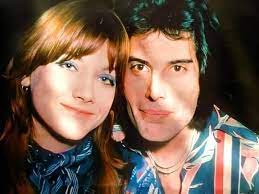 There is a nice picture of you and Freddie Mercury. Is there any interesting story with Freddie you‘d like to share with us?
There is a nice picture of you and Freddie Mercury. Is there any interesting story with Freddie you‘d like to share with us?
I met Freddie Mercury because I wanted to record my own solo album after Curved Air had broken up. So, I asked Roy Thomas Baker who produced Queen -I ran into him at a social gathering and I think Freddie was there too- if he would produce an album with me and he said he would. He asked me to work on some tracks together, three tracks and he took them to the record company he was working with then, but they didn’t fit them up and he left to do a different project, but he financed my band, Escape, to go on tour, so that was a good thing. I learned a lot about how Freddie worked, that he was very much perfectionist, that he prepared things for quite long before he goes in the studio and he was ready to record. I think Freddie had a fantastic voice. He’s one of my heroes. He was a fantastic performer. Extravaganza and big energy.
Do you feel lucky that you got to meet Brian Jones and Jimi Hendrix at The Speakeasy Club?
Yeah. I had been to Speakeasy regularly and one time Jimi Hendrix was standing there and so I thought I‘d go to say “Hello”, which I did. He was very sweet and spoke very softly. It was just a simple exchange of a fan with a musician, a polite “what’s happening” with a musician I had just met. Brian was there with a lot of other people and I was having a dinner there, at The Speakeasy restaurant, too. I was dreaming last night about Brian, because I belong to some Facebook groups dedicated to Brian Jones. So, he invited me and my friend (ed: Romi) for a conversation with him if we were getting along on our own. As he came back to his flat in Chelsea, I was impressed because there was a telephone in his bathroom in white suede carpet, which I hadn’t come across before. He was up and down listening to what had been recorded in the studio, which I think must have been “Their Satanic Majesties Request” (1967).
He was talking about playing this African-Arabic music and he was really enthusiastic about the Pipes of Pan in Joujouka and my girlfriend, who was very psychic and she had visions, she could see him as the God Pan. It was interesting because he was into the occult. The concept of it, not as far as performing rituals and joining a coven or anything like that. Just on his own. In his own way, with his music and stuff. So, I got to meet Brian. He said some words about Linda Lawrence, who was Donovan’s girlfriend and when Brian died, Donovan brought up young Julian. I remember Brian saying that his son was just been born and he was a very special child. His words were very warm. Brian’s manager, Allen Klein was there and Tom Keylock, Brian’s driver. Brian was very nervous at the car. He said he couldn’t drive anymore. I think he had been in an accident or somebody got killed in an accident, anyway, he was nervous of travelling or drinking and driving. It was wonderful. Even though I got to know him, he still had an air of woe about him. Whether he was stoned or not stoned or whatever, I think he was incredibly talented and very charismatic.
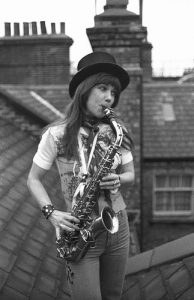 Siouxsie and the Banshees said that they were like “Curved Air with a different haircut” and also Rat Scabies (The Damned –drums) was a big fan. It is weird that Curved Air influenced punk musicians?
Siouxsie and the Banshees said that they were like “Curved Air with a different haircut” and also Rat Scabies (The Damned –drums) was a big fan. It is weird that Curved Air influenced punk musicians?
It’s more inspiring when people from other scenes like your music. Stewart and I, in the beginning of the punk movement, we were going down in the Roxy, which was a club in London where the punk was being made, but it was pretty much like an asylum scene. There were not many people, but the people who went there were very energetic. Those were X-Ray Spex, Billy Idol and Generation X; The Jam and Adam and the Ants played down there. We saw everybody who went down there and we got to know people from The Damned. Brian James (ed: The Damned –guitar) was a good friend of Stewart’s. I talked to Rat Scabies. He actually wanted to record a version of “Back Street Luv”, he told me at one time. So, that was the first time I knew that there was any interest in Curved Air. We just went there as people, we didn’t go there as members of Curved Air. We just went there to enjoy the punk scene. We had a New Year’s Eve party at the beginning of 1977, when several people from The Sex Pistols and people from the punk scene came, plus other people from the music industry. I remember Sid Vicious there. It was good to see that every time punk music was heard, everybody from music industry would say: “Oh, no! This is not music! This is terrible!” They weren’t very enthusiastic. We ‘d say: “No, this is just fantastic. This is where the energy is”.
Do you still use a skipping rope before going onstage?
No, but I did do that before our first big shows. We all had pre-gig rituals to do. Now, I walk around and don’t talk too much before I go on stage.
Is it possible to do a version of Jeff Buckley’s “So Real” in the new future?
Maybe I’ll do it with The Norman Beaker Band. We will try. I would love to do a Jeff Buckley song, because he’s another hero of mine, because of his songs, his energy and his immediacy. He was wonderful. I like Tom Waits, too. I sang a Tom Waits song (ed: “Alice”) on the Jools Holland’s show and I will be singing that with Norman Beaker, as well. That would be really a pleasure to explore.
A huge “THANK YOU” to Sonja Kristina for her time and to Billy James for his valuable help.
Official website: http://www.curvedair.com
Official Facebook page: https://www.facebook.com/CurvedAir
Official Sonja Kristina Facebook page: https://www.facebook.com/SonjaKristinaspage

